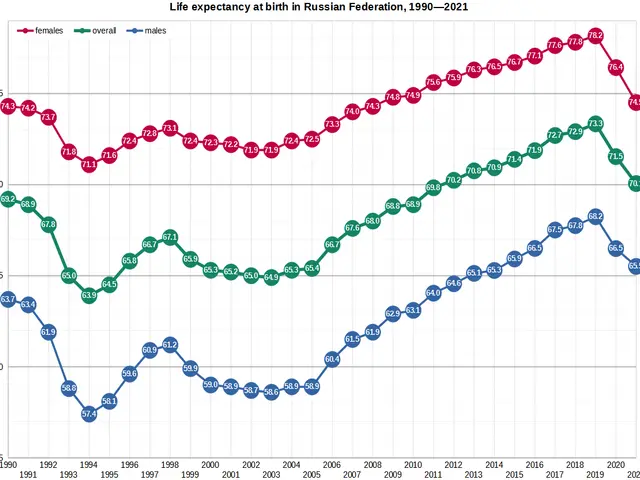Selling off government bonds at a reduced pace by the Bank of England
The Bank of England (BoE) has announced a reduction in the speed at which it offloads government debt, a process known as quantitative tightening (QT). This decision comes amidst a global sell-off in the financial markets, putting pressure on the bond market, including the UK, Europe, and the US.
Laith Khalaf, head of investment analysis for AJ Bell, has noted that the movement in 30-year bond yields, known as gilts, has closely tracked yields in the US coming down. In fact, over the course of this month, 30-year bond yields have moved down from a peak of almost 5.7% to just over 5.4%.
The BoE's decision to keep UK interest rates at 4% was made without lowering them in response to the global sell-off in the financial markets. However, Andrew Bailey, the BoE's governor, stated that the new QT target allows for continued reduction of the Bank's balance sheet while minimizing the impact on gilt market conditions.
The BoE's QT target has been reduced from £100 billion-a-year to £70 billion in the year ahead. This move was initially announced by Jerome Powell, the Chair of the US Federal Reserve, when he reduced the quantitative tightening target scope last year.
However, not all economists agree with this reduction. Carsten Jung, associate director for economic policy for think tank IPPR, argued that the BoE should have fully stopped active gilt sales. Jung expressed concern about the additional pressure on gilt yields at a time of global pressures.
Some economists also suggested that the reduction in the QT target does not go far enough. Laith Khalaf's comments suggest that the state of the gilt market is highly correlated with overseas developments.
It's worth noting that the yield on 30-year UK government bonds has reached a 27-year high. This means it costs more for the government to borrow from financial markets. However, the good news for Rachel Reeves, according to Laith Khalaf, is the decrease in 30-year bond yields.
The BoE bought hundreds of billions of pounds worth of bonds following the 2008 financial crisis. Since then, it has been selling off its stock of government bonds for several years. The Bank seems confident that QT is not having a big effect on the present state of the gilt market, according to Laith Khalaf.
In conclusion, the BoE's decision to reduce its QT target comes at a time of global pressure on the bond market. While the yield on gilts has reached a 27-year high, there are signs that it may be decreasing. However, the impact of this reduction on the gilt market remains to be seen.








